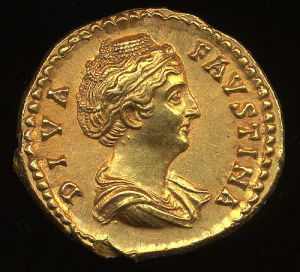Keeping Faustina's Memory Alive
The temple perpetuated memory of Faustina; so did coin issues which sometimes included an image of her temple. [1] During this era-when emperors without male heirs adopted their successors-the theme of family played an important role in visual communication. Faustina's ongoing significance speaks to her role as intercessor and guarantor of stability, even after death. [2]
_________________________________________________________________________________________________________________
1. Harold Mattingly, “The Consecration of Faustina the Elder and Her Daughter,” The Harvard Theological Review 41 (1948): 149.
2. Barbara Levick, Faustina I and II: Imperial Women of the Golden Age (Oxford: Oxford University Press, 2014): 60.
